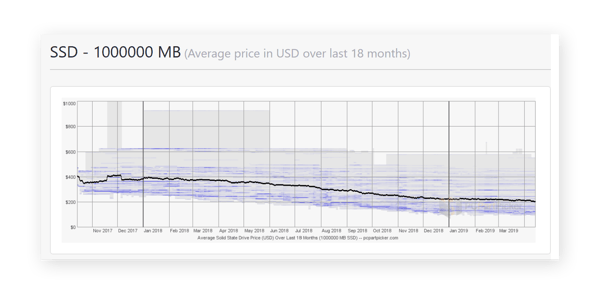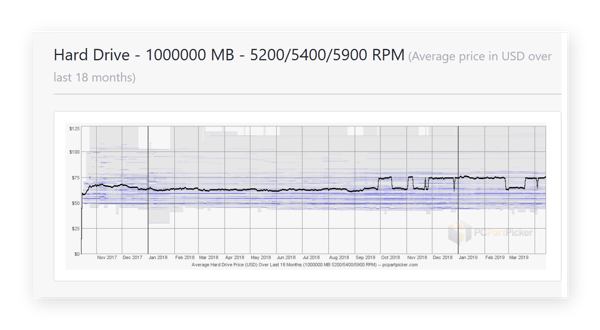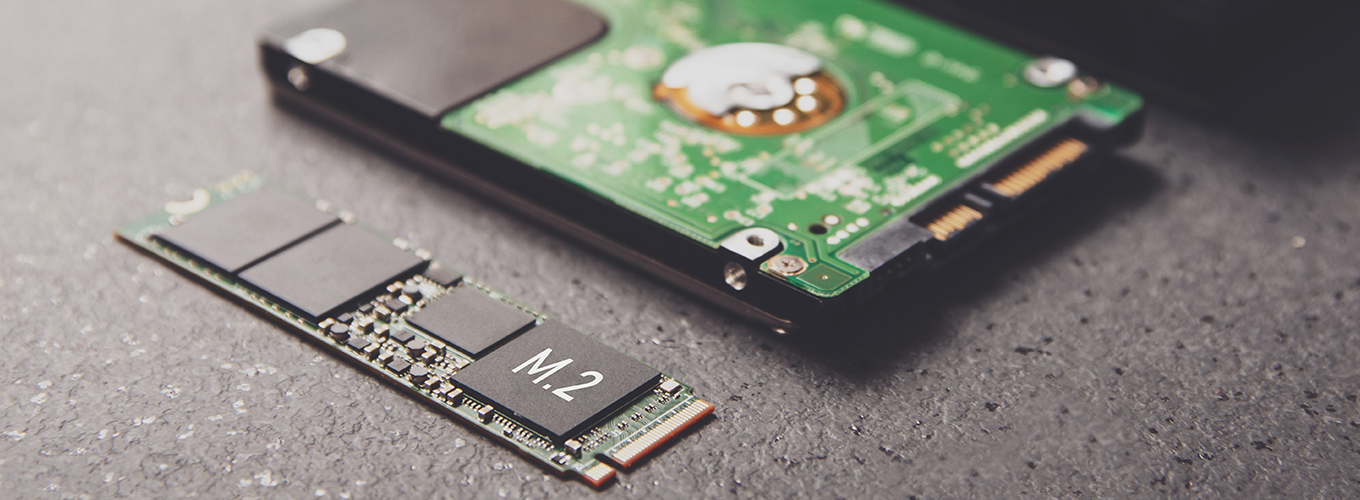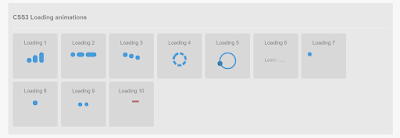SSD vs. HDD: Which Do You Need?
Are you running out of storage space? Is your old hard disk slowing to a crawl? Then it’s time for a hardware upgrade. But should you choose a cheaper, traditional hard disk drive? Or should you take the plunge and buy a fast SSD? We show you the differences between HDDs and SSDs in terms of speed, capacity, cost, and lifespan – so you can make an educated decision.
SSD vs. HDD: What’s the difference?
A hard disk drive (HDD) is an old-school storage device that uses mechanical platters and a moving read/write head to access data. A solid-state drive (SSD) is a newer, faster type of device that stores data on instantly-accessible memory chips.
- HDDs: An enclosure contains a series of platters covered by a ferromagnetic coating. The direction of the magnetization represents the individual bits. Data is read and written by a head (similar to the way vinyl record albums work) that moves extremely fast from one area of the disk to another. Since all of these pieces are “mechanical,” the hard disk is the slowest component of any computer – and the most fragile.
- SSD: These newer types of disks store information on flash memory, which consists of individual memory cells storing bits that are instantly accessible by the controller.
Why are SSDs useful for laptops?
While lower-priced laptops still come with traditional hard drives (it’s one way for manufacturers to minimize their costs), most midrange to high-end machines come with an SSD.
Due to their non-mechanical nature, SSDs require less power, which translates into better battery life.
They’re also shock-resistant. Hard disks have moving parts. If you drop your laptop, chances are that the read/write head of an old-school hard drive is in motion, which could lead to data failure. This doesn’t apply to SSDs.
It isn’t always an either/or choice. In some cases, you find “hybrid” computers. The system partition that contains the operating system, application programs, and the most-used files are installed on an SSD. Other data, such as movies, photos, and documents, are stored on a traditional HDD, which is larger and less expensive.
How much faster are solid-state drives compared to hard disk drives?
The speed difference is significant. SSDs are extremely fast in all areas, but the speed difference is more pronounced when performing certain tasks, such as:
- Sequential read/write operations: Copying and moving huge files (such as movies) is where the difference is most apparent. On old-school HDDs, the copying process takes 30-150 MB per second (MB/s), where the same action takes about 500 MB/s on normal SSD, or even 3,000-3,500 MB/s on new NVME SSDs. In this example, copying a 20 GB movie is complete in less than 10 seconds with an SSD, while a hard disk would need at least two minutes.
- Small “4K” read/write operations: Most of the time, when you run Windows (or MacOS), open programs, or browse the web, you’re actually opening and manipulating thousands of smaller files, which are stored in small blocks of data (usually sized at 4K). The faster your disk can read (and write) these 4K blocks, the faster and snappier your system seems. With HDDs, the speed ranges from 0.1 to 1.7 megabytes per second (MB/s). SSDs and NVME SSDs, however, operate at much faster speeds of 50-250 MB/s in 4K reads/writes.
What’s the lifespan of an SSD
There are lots of myths surrounding SSD life spans, and the assumptions go back to the early days of SSDs in the 1990s and early 2000s. It is true that SSD cells have a limited lifespan, but today this is not really an issue.
In theory, the more data written to a cell, the faster it wears out. Nowadays, an SSD cell survives about 3,000 write cycles, which doesn’t sound like much at first. But thanks to the principle of wear leveling, the SSD controller makes sure that write operations are spread evenly across all cells in order to minimize “cell death.” Additionally, modern SSDs contain spare cells that will replace cells that go bad. This is called bad block management, and it’s why the larger the SSD, the longer its lifespan.
However, even if you were to constantly write data on to a hard disk, 24 hours a day, you’d still have decades until the disk eventually dies.
What about capacity differences between HDDs and SSDs?
If you are concerned about how much information you can store on each type of drive, be reassured. There are no differences in storage capacity. You can get HDDs and SSDs in similar sizes. Usually the range is 128 GB to 2 TB.
However, larger SSDs are still more expensive, so let’s talk about…
Price differences between HDDs and SSDs
The market for flash storage is volatile, and it varies based on supply and demand. While the price for SSDs has decreased a lot, there is still a significant price difference. A 500 GB HDD costs between $25 and $50 (for faster, higher-end models), whereas a 500 GB SSD costs from around $60 to $150. Naturally, these numbers will change over time.


In this example from April 2019, you can see that the old-school HDDs either remained around the same price point or they experienced sudden spikes. In contrast, the price for a 1 TB SSD dropped from around $400 to slightly above $200 (with some discounted models at $100-150).
Is an HDD or an SDD better for gaming?
Given the huge amounts of data a game has to shuffle back and forth (loading levels, character models, etc), an SSD helps games load and run faster. You’ll also experience less stutter when playing games, as the rest of your PC doesn’t need to wait for game data to load – which can give you quite an advantage, especially in the eSports arena.
Here’s a simple example: Loading the world of GTA V takes about 25 seconds on my Samsung 970 Evo Plus with SSD, compared to more than two minutes when using an old mechanical hard disk. A game changer.
Summary
If you’re simply looking for a cheap way to store files, then you can still get a great deal with HDDs. They offer lots of terabytes for budget prices.
But for your “primary” drive (your operating system, application programs, and most-used files), you should upgrade to an SSD, as it offers dramatically improved speeds.
In all cases, SSD or HDD, you’ll need to keep your drive clean. Your operating system requires a lot of disk space to operate – and running low on space can cause extreme slowdowns and even crashes.
To prevent this from happening, try Avast Cleanup or Avast Cleanup for Mac, which keep your computer clean and running its best.
[Related content]
For more this type of content or If you want to know amazing facts , tricks ,tips about technology or you want to learn coding then follow
coder__bhai on instagram
For more this type of content or If you want to know amazing facts , tricks ,tips about technology or you want to learn coding then follow
coder__bhai on instagram





Comments
Post a Comment